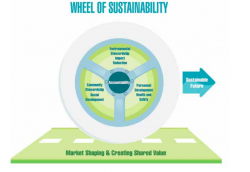Our Sustainability History
For more than a decade, Ayala Land remains to be at the forefront of embedding sustainability practices in all of its developments, products, and services. With sustainability as our guiding principle in enhancing land and enriching lives, we have not only created long-term value for our customers, investors and various stakeholders, but also contributed environmental, social and economic benefits for the public.
2007
- Sustainability was formalized as guiding principle to Ayala Land’s brand of land use and development.
- First sustainability report was published. The report followed the GRI (Global Reporting Initiative) G3 Reporting Guidelines.
- Launch of BeneficiALI: Ayala Land Campaign for Sustainability
2008
- The Ayala Land Sustainability Framework was established as a guidance on sustainable property development. It was composed of five pillars, namely: Environmental Stewardship and Impact Reduction; Community Stewardship and Social Development; Personnel Development, Health and Safety; Market Shaping; and Accountability

2009
- A Board-Level Sustainability Committee was formally created and ratified by the Company’s Board of Directors. The Committee was charged with two main functions: (1) oversee the Company’s implementation of its overall sustainability program, and (2) ensure the Company’s alignment with the Ayala Group Sustainable Development Policy.
2010
- ALI reached major milestones in environmental stewardship such as LEED certification, Green Procurement Initiative, creation of energy solutions company PhilEnergy, and contribution to national green design metrics.
2011
- BellaVita, the country’s first social enterprise community development, was launched as ALI implemented a broader-based approach to growth and expansion through product lines for various segments of the economic pyramid.
2012
- Ayala Land began disclosing climate-related information through the Carbon Disclosure Project
- We progressed to A+ level reporting, with external assurance secured from TUV Rheinland. The externally assured report highlighted efforts to achieve the seamless assimilation of the Company’s five principles of sustainability into the business process to become the bedrock of master-planning for future developments.
2013
- ALI shifted from GRI 3.1 to GRI G4 reporting guidelines that emphasized disclosures on management approach (DMAs) as a means to benchmark its practices against global sustainability standards and helped Ayala Land with a methodology to identify its material sustainability concerns.
2014
- The company transformed the sustainability framework from 5 Pillars to Four Focus Areas following our materiality process. These Four Focus Areas serve as measures to sustainability performance that provide a comprehensive discussion on how we embed sustainability in the way we conduct the business.

2016
- Ayala Land transitioned from a standalone sustainability report to an integrated report. It followed the International Integrated Reporting <IR> Framework to combine financial and non-financial reporting and disclose how the company is creating shared value over the short, medium and long-term
- Ayala Land was listed as the only Philippine company in the S&P Global Dow Jones Sustainability Index
2017
- Ayala Land announced an aggressive plan to reduce the greenhouse gas (GHG) emissions in its commercial properties and aimed to be carbon neutral by 2022. The company plans to achieved this through a combination of initiatives, which include passive cooling design, energy efficiency, renewable energy sourcing, and carbon offset mechanisms such as forest regeneration and protection.
- Ayala Land became the first and only Philippine company to be included in the RobecoSAM Sustainability Yearbook (now under S&P Global).
2018
- A year after announcing the carbon neutrality goal, Ayala Land has reduced the net emissions of its commercial properties by 62% through shifting its properties to clean energy sources and protecting and enhancing 560 hectares of carbon forests.
2019
- The company’s Circular Waste Management program began through the Arca South and Lio Ecohub. The Ecohub is a plastic processing facility made to collect, reprocess and embed clean and dry plastics in construction products for Ayala Land projects
2020
- Ayala Land’s rating on climate change disclosures in the Carbon Disclosure Project increased to A- (Leadership) from C (Awareness).
2021
- Ayala Land, as part of the Ayala Group, announced its commitment to achieve Net Zero by 2050.
2022
- Ayala Land achieved a B (Management) on Water Security rating from Carbon Disclosure Project, which is the highest rating for a Philippine company
- Ayala Land kicked-off its Net Zero Task Force that is mandated to identify and implement ALI’s net zero road map
2023
- Ayala Land set targets for circular approaches to waste and water management
- Ayala Land Offices and AREIT signed an agreement with the International Finance Corporation (IFC) to pursue IFC’s EDGE Zero Carbon certification for the office portfolio.
- The carbon stock and carbon removals for 4 out of 6 Carbon Forests have been verified by an accredited third-party.
- A Sustainability Leaders’ Network was formally established within Ayala Land.
2024
- Ayala Land received validation and approval from the Science Based Targets initiative (SBTi) for its near-term and long term net-zero science-based greenhouse gas (GHG) emission reduction targets, aligned with the Business Ambition for 1.5°C.
- Ayala Land pioneers the Sustainability-Linked Financing (SLF) Program as a PH real estate company, securing a P14 billion Sustainability-Linked Bond (SL-Bond) & a P14.5 billion Sustainability-Linked Loan (SL-Loan) from the International Finance Corporation (IFC).
- Ayala Land Hospitality signed an agreement with IFC to pursue IFC’s EDGE Zero Carbon certification for the hotel portfolio.

